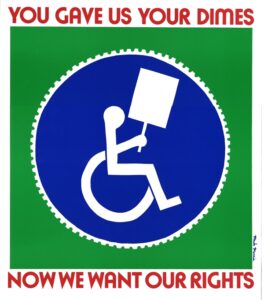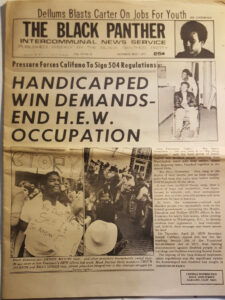By Elizabeth Gerberich
As we approach a year since COVID-19 reached Texas, I set out to write a post about the pandemic, disability/chronic illness, disability justice, and collective care. However, while researching, the DAC blog team realized that the blog hadn’t yet featured a post focused on disability studies or disability justice. In light of this, we hope to provide a brief overview of the discipline and related resources in our collections. It is impossible to honor all of the nuances of both a discipline and the struggle for justice in one blog post; however we invite you to take a look at these resources and hope they provide a starting point for further exploration and knowledge-making.
Disability studies arose in the late twentieth century from the first wave of the disability rights movement. It is an interdisciplinary field incorporating a broad range of disciplines and professions—architecture, art, sociology, law, social work, health professions, radio/television/film, urban studies and education, just to name a few. At its heart is the interrogation of who and what we deem “normal,” whether through designing accessible public transit, crafting inclusive education policy, or examining tropes of disability representation in film.

Like all fields, conceptual approaches in disability studies have shifted and continue to shift over time, especially as our cultural understandings and definitions of disability change. Much of the initial writing in the field centered on a “medical model” of disability, which identifies certain physical or mental impairments or conditions in individual bodies. Later scholarship turned to a “social model,” which contends that society at large disables individuals as it fails to acknowledge the full range of diverse bodies and minds. Influenced by the disability justice movement, more recent scholarship calls both models into question, as many writers seek to deconstruct and reimagine boundaries between the physical and the social.
Disability studies scholars and disability justice activists alike recognize the importance of understanding disability as a distinct facet of identity, similar to how we understand race, gender, sexuality, and class. As such, the discipline is intertwined—though not convergent––with critical race studies, gender studies, queer studies, and other schools of critical thought. You will find that the resources listed below often combine one or more of these fields.
Differing definitions of disability across both disciplines and time may present challenges for those doing research in disability studies. A legal definition of disability, for example, may not conform with a cultural understanding of it, and terms found in sources may be outdated, inaccurate, or even hurtful and triggering for contemporary readers. Given the relative recency of disability studies’ formalization as a discipline in higher education, some older or historical resources may not be cataloged with appropriate subject headings.

Amidst a pandemic that has exacerbated divides in access to education and healthcare, reinforced policies and narratives of disposability based on disability, and expanded the number of people living with disabilities and chronic illness, it can seem that disability studies is especially relevant now, more than ever. However, as disability justice activists have noted, for those of us who are disabled or chronically ill (as many are and have always been) COVID-19 has only highlighted long persistent struggles for inclusion, equity, and access.
In compiling these resources, we hope to provide a starting point for both understanding the context of these struggles and for continuing to work towards a more accessible & equitable future. For more information on disability studies at UT, check out the Texas Center for Disability Studies’ website, and for information about campus resources for students with disabilities, check out the SSD.
Resources:
Books
Bell, Christopher M. Blackness and Disability : Critical Examinations and Cultural Interventions / Edited by Christopher M. Bell. East Lansing: Michigan State University Press, 2011. Print.
Charlton, James I. Nothing About Us Without Us : Disability Oppression and Empowerment / James I. Charlton. Berkeley, CA: University of California Press,, 1999.
Davis, Lennard J. Enforcing Normalcy : Disability, Deafness, and the Body / Lennard J. Davis. London ;: Verso, 1995.
Davis, Lennard J. The Disability Studies Reader. 4th ed., Taylor and Francis, 2013.
Goodley, Dan. Dis/ability Studies : Theorising Disablism and Ableism / Dan Goodley. Abingdon, Oxon ;: Routledge, 2014.
Kafer, Alison. Feminist, Queer, Crip / Alison Kafer. Bloomington, Indiana: Indiana University Press, 2013.
Longmore, Paul K., and Lauri Umansky. The New Disability History : American Perspectives / Edited by Paul K. Longmore and Lauri Umansky. New York: New York University Press, 2001.
Lorde, Audre. The Cancer Journals / Audre Lorde. Special ed. San Francisco: Aunt Lute Books, 1997.
McRuer, Robert. Crip Theory : Cultural Signs of Queerness and Disability / Robert McRuer ; Foreword by Michael Bérubé. New York: New York University Press, 2006.
Nielsen, Kim E. A Disability History of the United States / Kim E. Nielsen. Boston: Beacon Press, 2012.
Schlund-Vials, Gill. Disability, Human Rights and the Limits of Humanitarianism. Taylor and Francis, 2016. Web.
Serlin, David, Benjamin Reiss, and Rachel Adams. Keywords for Disability Studies Edited by Rachel Adams, Benjamin Reiss, and David Serlin. [Enhanced Credo edition]. Boston, Massachusetts: Credo Reference, 2020.
Titchkosky, Tanya. The Question of Access : Disability, Space, Meaning / Tanya Titchkosky. Toronto: University of Toronto Press, 2011.
Wong, Alice. Disability Visibility. Vintage, 2020.
Articles
Invalid, Sins. “Skin, Tooth, and Bone – The Basis of Movement Is Our People: A Disability Justice Primer.” Reproductive health matters 25, no. 50 (June 12, 2017): 149–150.
Kudlick, Catherine. “Disability History: Why We Need Another ‘Other.’” The American historical review 108, no. 3 (June 2003): 763–793.
Wendell, Susan. “Unhealthy Disabled: Treating Chronic Illnesses as Disabilities.” Hypatia 16, no. 4 (October 1, 2001): 17–33.
